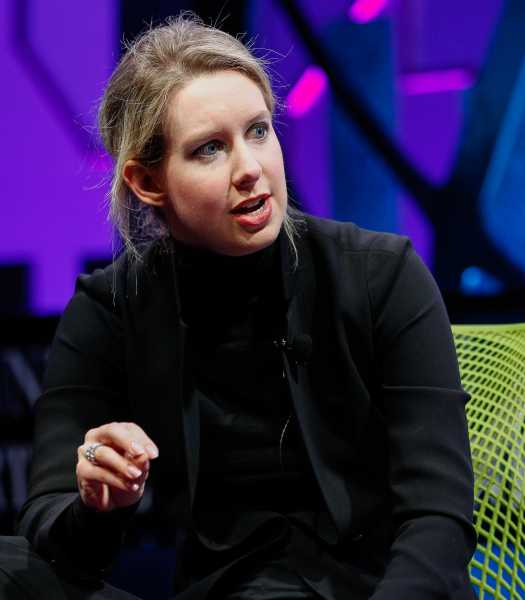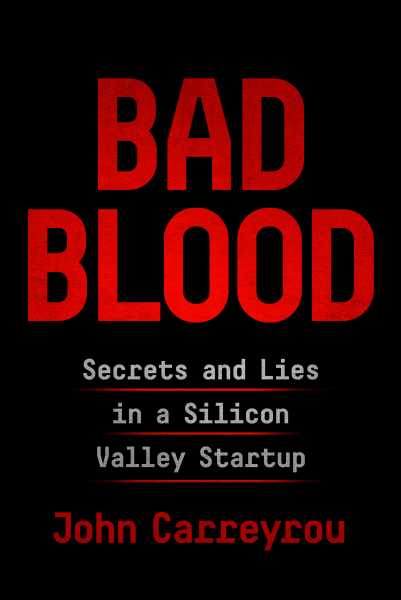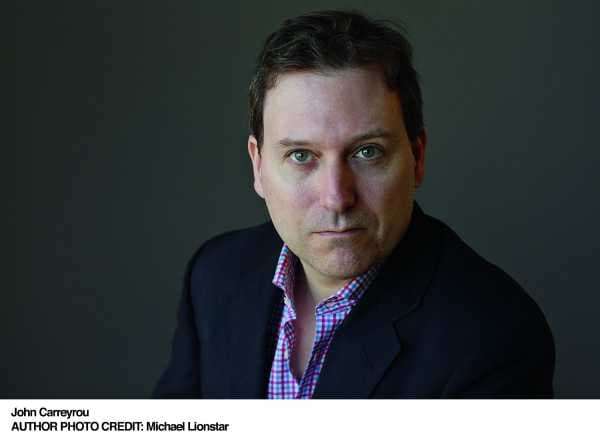
When Theranos founder Elizabeth Holmes set out to revolutionize the multibillion-dollar blood testing industry, she wasn’t building a health science startup. She was building a religious cult, completely divorced from medical evidence.
The Stanford dropout often told the employees at her Silicon Valley startup that if they didn’t believe in her and the company mission, they should quit immediately, as John Carreyrou tells it in his riveting new book, Bad Blood.
Whenever anyone raised questions about her technology — which she claimed could run hundreds of tests and detect diseases early based on a small drop of blood — she fired them, tried to muzzle them with legal threats, or accused them of sexism.

Yet even as Holmes’s blood tests were first being rolled out in Walgreens five years ago for thousands of patients to access, her technology had never been validated or externally vetted. Holmes also misled investors on how much revenue the company was going to make, and faked demonstrations of her lab equipment to keep the charade going.
The list of high-profile people Holmes managed to hoodwink is almost as eye-popping as her deceits. It includes economist and political figure George Shultz, Defense Secretary James Mattis, and media tycoon Rupert Murdoch, who incidentally owns the Wall Street Journal, where Carreyrou works and did much of his reporting for the book.
At its peak, Theranos was valued at $9 billion and employed 800 people. Yet according to Carreyrou, as of this week, Theranos is down to just 20 employees who are working to turn the company’s lights off within the next month and a half.
This is largely thanks to Carreyrou’s sleuthing. He published his first story in the Journal in October 2015. By 2016, the company was correcting thousands of lab test results. By March of this year, the Securities and Exchange Commission had charged Holmes with defrauding investors and stripped her of control of the company she founded. Holmes may face criminal charges too.
I had read Carreyrou’s reporting in the Journal and wasn’t sure I’d learn much more from the book. But I couldn’t put it down, largely because of how he answers the question at the heart of this scandal: how Holmes managed to create a multibillion-dollar valuation out of nothing. It’s as much a cautionary tale of what happens when Silicon Valley’s “fake it till you make it” mentality meets public health as it is a study of human psychology.
I recently called up Carreyrou to find out what Holmes is doing now, what he’d ask her if he could (he’s never interviewed her), and whether he’s optimistic about health journalism and Silicon Valley tech regulation post-Theranos. The conversation that follows has been edited for length and clarity.
Julia Belluz
I’m really interested in this tension between slow and plodding science and the speed of innovation in Silicon Valley. There are a couple of times in the book where you mention that Holmes voiced frustrations to her employees about the process of science — that it’s too slow and too cumbersome — and her dislike of scientific experts. How much is she a product of Silicon Valley?
John Carreyrou
One of her advisers was Larry Ellison [the billionaire co-founder and CEO of Oracle]. Larry Ellison’s advice to her was that in his early years, he was also getting told by the coders and guys creating the software he was selling that “this isn’t feasible” and “we can’t get it done on time.” And [Larry] was always pushing them to deliver and ignoring their complaints. And he told [Elizabeth] to do the same.

Of course, that was terrible advice and he was a bad role model. He famously engaged in vaporware in the early years of Oracle, promising things he couldn’t deliver. That’s the advice he was giving her, and she was drinking it up.
Julia Belluz
So what do you now think is the right trade-off between innovation and science and patient safety?
John Carreyrou
There’s more and more of a convergence between traditional Silicon Valley technology and health innovation. That convergence is only going to intensify in the coming years.
The Theranos story is a cautionary tale for people — whether they [are] startup founders or other types of investors involved in this burgeoning corner of Silicon Valley, which people refer to as health tech. It’s a reminder that your consumer isn’t just someone sitting at home or on the go, disappointed if their Twitter feed has an outage. It’s someone who is going to be making an important health decision based on how your product works. They should bear that in mind — lives are at stake.
Most people are ethical, and most people have boundaries they know they don’t want to cross. So it’s relying on a commonsense code of ethics and reminding yourself that what you’re doing is trying to improve medicine and not harm people. It’s as simple as that, really.
Julia Belluz
Part of the reason Theranos got away with its bold, untested claims for so long has to do with how we the media covered Silicon Valley — which was very uncritically. Do you think that’s changing now?
John Carreyrou
There has been a readjustment over the past three years. The coverage has been more skeptical. There has been a litany of other scandals, some involving Uber, Lending Tree, Hampton Creek — the list goes on and on. The press has done a better job of vetting these companies and founders’ claims as opposed to taking their word for it and lionizing them.
There’s also a backlash against big tech — against Facebook, Twitter, Google — over the data privacy issues. So we’re in a different place and a healthier place.
But I also don’t like to blame reporters who wrote about Holmes on the way up. They were outright lied to. When they went in, there was no reason to suspect they were dealing with a pathological liar.
Julia Belluz
And it wasn’t just journalists who bought into Holmes’s lies. It was also regulators and the investors in the Silicon Valley startup ecosystem. What message do you hope your book sends to Silicon Valley?
John Carreyrou
Silicon Valley companies, at least the private ones, have had this mentality that because they are not publicly traded, they don’t have to play by the rules everyone else has to play by. That’s what got Uber into trouble as well. I think Theranos and Uber are a reminder that just because you’re private doesn’t mean you don’t have to abide by the same rules other companies and citizens have to abide by.
Julia Belluz
What do you think drives Holmes?
John Carreyrou
She’s very headstrong and stubborn. From her point of view, she feels like, “I’m a determined entrepreneur and I’m not going to let these last few years of setbacks bring me down. I’m going to continue to forge on with my vision and ambition.” She’s probably thinking of it in terms of other people, like Larry Ellison. She’s like, “I’m going to be like him and I’m going to rebound.”
The problem is Larry Ellison didn’t essentially commit white-collar crime and put tens of [thousands of patients in harm’s way].
Julia Belluz
There are a few other themes in the book that explain how Holmes duped so many people. One, it seems, is she was an incredibly persuasive person. But another is that people seemed to really want to believe in her and want her idea to work.
John Carreyrou
She was going to be the first tech founder billionaire who is a woman. It was also that her product and her company were going to do good, as opposed to just being a smartphone app that you can use to hail a taxi. The two parts of that proposition combined were very potent. It was like catnip.
[Fear of missing out] was a huge factor with investors. She raised most of the money after going live in Walgreens stores, after September 2013. And I think among investors, it was FOMO. They wanted to be in on this gold rush.
Julia Belluz
You also raise the question, at the end of the book, of whether Holmes is a “sociopath.”
John Carreyrou
I think it’s a legitimate question to raise. When you’ve told that many lies over such a long period of time, and once the consequences of those lies are exposed, you’re unable to recognize you’ve done anything wrong. And you’re conveniently blocking out the fact you may have done real harm to people with these faulty blood tests — to the point of digging your heels in and continuing to burn investor money on lawyers. You know, hundreds of millions of dollars have been paid to lawyers over the past two and a half years.
I think in the weeks after my first story came out in the fall of 2015, someone who is not a sociopath would say, “Whoa, this has gone off the rails. I should publicly apologize, do everything I can to make things right and return the money I still have in the bank to shareholders.” Most normal people with moral compasses would behave that way.
Julia Belluz
You talked to more than 150 people for this book and your Wall Street Journal stories. But you never talked to Holmes. Why do you think she refused?
John Carreyrou
I think from her point of view she sensed this one guy had finally figured out the truth. And that he had an excellent BS detector, and she was not going to be able to snow him like she had countless people before. So her approach became to try to quash my story.
Julia Belluz
If you could talk to her, do you think it would have changed anything? And what would you ask her?
John Carreyrou
I don’t think it would have changed anything from the point of view of my reporting. I had my confidential sources whom I trusted, whom I knew to be unimpeachable. I had the questionable test results from patients and doctors. I don’t think she would have been able to magically put her spell on me and change my thesis.
I’d want to ask her how she was able to rationalize putting the public health in jeopardy. Clearly, her game from the beginning was that the ends justify the means. She wanted to be this tech billionaire, this icon of Silicon Valley, and she thought the technology would eventually catch up with all the promises she made. [She thought] the whole “fake it until you make it” gambit would have worked.
So I would say, “I get you modeled yourself after the computer industry, and these people like [Apple founder] Steve Jobs did fake it until they made it. But you had a medical product, and while you pursued that approach, how were you able to justify putting patients in harm’s way?”
Julia Belluz
In your reporting, you outline cases of people who got the wrong blood test results from Theranos’s labs. But has anyone died as a result of the faulty test results?
John Carreyrou
My answer is no. But do I rule it out? No.
I just don’t know the answer to that question. I think the chances someone would have died would have shot up sharply if Theranos and Walgreens had deployed their technology nationally. There’s no doubt in my mind it would have been a lot of worse if I hadn’t exposed this when I did.
But I also want to emphasize that we still don’t know the full extent of the damage. We do know that close to 80,000 Arizona residents who had their blood tested at Theranos have been reimbursed in full. Almost a million blood test results in Arizona and California have been voided and retested.
I know the last lab director Elizabeth brought in, in the wake of my first story, was recommending to Elizabeth that she void every single blood test result they had returned to a doctor or patient. So he was in favor of voiding 7.5 million blood test results because the quality assurance and control was so terrible.
Julia Belluz
So there are potentially millions of people who got potentially erroneous blood test results from Theranos?
John Carreyrou
[Theranos testing] started in the fall of 2013 in one Walgreens store in Palo Alto. Walgreens stopped testing people in October 2016 — so there were three years of faulty blood tests. My understanding is that they gave, during those three years, 7.5 million blood test results. Of course, that doesn’t amount to 7.5 million patients because when you get a blood test, you’ll get a dozen tests at a time.
Julia Belluz
What is the state of the criminal charges against Holmes? Might she end up in prison?
John Carreyrou
I keep hearing from several sources [that the criminal investigation is] very advanced, and the criminal charges are very possible, if not likely. The targets would be Elizabeth and Sunny Balwani [the former president and chief operating officer at Theranos, and Holmes’s ex-boyfriend]. I don’t think anyone else will be indicted but those two. The charges, if they do bring them, will be securities fraud, lying to federal officials, and Medicare fraud conspiracy counts.
Knowing what I know of Elizabeth and Sunny, they will fight these charges vigorously if they are filed. So there would be a trial, and the government will have to prove the case at trial. But I think the evidence is overwhelming enough that they could do that. And if Sunny and Elizabeth were to lose that trial, they face prison time.
Julia Belluz
I read that Elizabeth Holmes is raising money for a new startup. What? Do we know anything about it?
John Carreyrou
She’s been telling people she’s going to start a new company. It’s going to take some strands of what she is trying to do at Theranos. So it’s still going to be health-related.
This is what she wants to do. There’s a difference between what someone wants to do and what is possible. I have no doubt she can incorporate a new entity in Delaware, but if federal prosecutors indict her within the next few months, I don’t see anyone buying shares in this company.
Julia Belluz
How did you feel when you heard that — that she is starting a new health tech company?
John Carreyrou
I think it’s crazy, but it’s also in keeping with how removed from reality she’s been. Employees who had been there the last couple of years say that she doesn’t consider she did anything wrong.
To the extent that mistakes were committed, [she believes] she was led astray by her entourage, and that she’s been the victim of this takedown, namely by me, instead of letting the magnitude of the wrongdoing and its consequences sink in and apologizing to patients or admitting she did something wrong. She’s instead completely still focused on herself and seeing herself as a victim.
Further reading
- Bad Blood
- John Carreyrou’s Theranos series in the Wall Street Journal
- Vox’s Theranos downfall explainer
- How Elizabeths Holmes’ House of Cards came Tumbling Down
Sourse: vox.com






